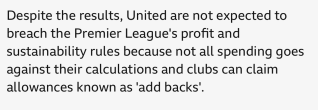Relevant bits:
Leicester is a case that has divided opinion, having been charged by the Premier League with exceeding the loss limit of £105million to the tune of £24.4million in the three years up to June 30, 2023. They have been accused of exploiting a loophole in the rules, because their relegation to the Championship on June 13 last year seemingly meant they were no longer under the Premier League’s jurisdiction.
“Some people say it’s a technicality, a loophole,” says De Marco. “But it’s much more than that in this case because you are relegated on June 13 and your account end is June 30.
“You know that football’s main business is in the summer transfer window, which starts on June 14. So you’ve got two weeks in which you can spend or sell for tens or hundreds of millions, and what you do in those two weeks will be determinative of whether or not you have breached the rules.
“Then imagine a club that’s been completely prudent and is heading to be well within the £105million limit and it’s faced with relegation and it thinks, ‘OK, we’ve got a lot of players coming out of contract, we’re going to the championship and we’ve got to get straight back up’.
“So they spend £50million on a couple of the best strikers and that puts them over the limit. They’re over the limit after they’ve left the Premier League. So when you think about it, it’s not a technicality or loophole. The question is when does the breach occur, and the breach only occurs at the end of that period and that period is after the club is in the Premier League.”
The real problem, as De Marco sees it, is the fact that the rules are not aligned between the different leagues. “You have all these strange inconsistencies,” he says. “It’s remarkable to me that the Premier League didn’t think about this before, and you can see from their rather over-the-top press statement that they don’t accept it.
“But their own argument to the panel was ‘look, we accept our rules are really badly drafted so can you help us out?’ Which isn’t the argument of someone who’s been very careful and is very confident about their own rules.”
“As a football fan I really do think points deductions should be the very last thing people look at for breaches. Yet it’s becoming a routine starting point, and I do think that spoils a lot of the fun and entertainment of the game.
“I can still see the argument for points deductions, because they can be the best way to redress a sporting advantage given the obvious flaws with financial penalties. If you are a very wealthy owner, intent on just spending anything in breach of the rules, you’re not going to worry too much about a financial penalty. But I still think point deductions should be a last resort.”
De Marco takes issue with the rules themselves. “I think the real problem is the more fundamental issue with the profit and sustainability rules,” he says. “They’ve never been about fairness. They’ve never been about fair competition.
“They’re not even justified by those who have brought them in on the basis of fairness. They are justified on the basis of promoting financial sustainability. And what that means is if you are a club that earns ten times more than Luton Town, for instance, you can spend ten times more than Luton Town.
“That’s not fair in terms of a fair competition, but it’s arguably sustainable. But there is also a danger that it stratifies the status quo and it means nobody can compete with the very top clubs. It’s anti-competitive and it’s not dealing with the real problems of sustainability in English football, which is a disparity between the Premier League and the rest of the leagues.
“Those problems haven’t been solved in any way by profit and sustainability rules, and we need to see some fundamental rethinking.”
He does believe an independent regulator might help, but that too depends on the extent of its power. “In terms of financial regulation, it needs to be more light touch,” he says. “And what they’re generally proposing, in terms of financial regulation, is a lot more sensible and reasonable than the PSR rules.
“The Premier League is a fantastic product, and what we shouldn’t do here is kill the golden goose.”




